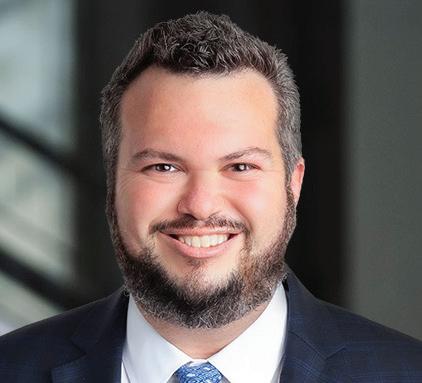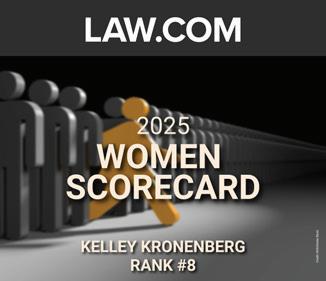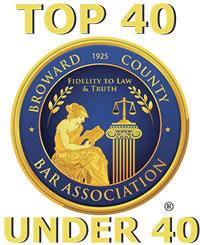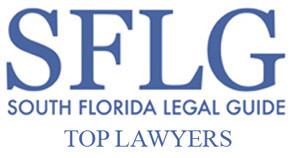REAL ESTATE EDITION

IN THIS ISSUE: FLORIDA
● Tenant’s Rights after Foreclosure under the PTFA and Section 83.5615, Fla. Stat.
● Failure To Offer A Borrower A Loan Modification Is Not A Sufficient Ground To Vacate The Foreclosure Sale
● How The Amendments To The Florida Rules Of Civil Procedure Affect Foreclosure Actions
● Retention Of Jurisdiction Post-Judgment
● Ownership v. Owner of Servicing Rights: The Difference Matters ILLINOIS
● Appellate Court: Five-Year Statute of Limitations Applies to Home Equity Line of Credit
● Illinois First District Appellate Court Finds Mortgage Remains Valid Lien on Title Even If Debt No Longer Enforceable NEWYORK
● High-Stakes FAPA Decision Looms as Court of Appeals Grants Review
WELCOME EDITOR’S LETTER

Jason M. Vanslette Editor and Chair of Real Estate Division
Anyone can hold the helm when the sea is calm.
–Publilius Syrus
As we turn to the last quarter of 2025, our team brings another exciting and informative publication for our clients. The timing of this edition is tantamount as mortgage defaults continue to rise in a straining U.S. economy, causing high inflation rates and increasing unemployment. Unknown geopolitical tensions and global unrest continue to add uncertainty within the private sector, and general household affordability is a growing concern for most single-family residents. Major changes in law and regulations are shaping how our industry navigates this continuing economic crisis,
and our team has put together several articles on the same to ensure our clients are prepared to withstand the brewing storms.
From major Statute of Limitations changes in Illinois to challenging the retroactive application of New York’s infamous FAPA law, our recent edition of “In the Know” is a must-read for all clients. We look forward to sharing these landmark cases and regulatory changes to help our industry navigate the housing market waters, whether in rising, turbulent waves or even calm seas.


FLORIDA
TENANT’S RIGHTS AFTER FORECLOSURE UNDER THE PTFA AND SECTION 83.5615, FLA. STAT.
FAILURE TO OFFER A BORROWER A LOAN MODIFICATION IS NOT A SUFFICIENT GROUND TO VACATE THE FORECLOSURE SALE
HOW THE AMENDMENTS TO THE FLORIDA RULES OF CIVIL PROCEDURE AFFECT FORECLOSURE ACTIONS
RETENTION OF JURISDICTION POST-JUDGMENT
ILLINOIS

Tenant’s Rights after Foreclosure under the PTFA and Section 83.5615, Fla. Stat.

By: Jason M. Vanslette Editor and Chair of Real Estate Division
KK TAKEAWAY:
Mortgage Servicers and Lenders must be aware of state and federal protections for tenants who have a property after a successful foreclosure. Evaluating their lease and circumstances of the lease execution is crucial to determining marketability at REO.
BACKGROUND:
In 2009, Congress enacted the “Protecting Tenants at Foreclosure Act” (PTFA) to assist with hardships of millions of renters and tenants who were undoubtedly affected by their landlord or property owner’s foreclosure proceedings. As paying tenants under a “bona fide” lease were abruptly displaced through the foreclosure process during the financial crisis, Congress enacted sweeping legislation to ensure renting families had more protections and stability during the foreclosure process.
Although the PTFA affected all states, the legislation naturally expired at the end of 2014.
However, in May of 2018, the PTFA was made permanent by the 115th Congress and adopted by many states, including Florida (Section 83.5615, Fla. Stat. which mirrors the PTFA exactly), that now protects tenants whose property is ultimately foreclosed to the present day.
However, these protections are limited (as discussed below) and the evidentiary burdens to prove a qualified protection should be carefully reviewed by all our mortgage servicer and lender clients prior to initiating the REO process after obtaining title post-foreclosure.
A stated above, in order for tenants to have protection under the PTFA, they must prove the following five (5) elements: (1) that he/she has legal standing to raise a PTFA defense; (2) that he/she entered the lease before the “certificate of Title” was issued to a new owner; (3) that his/her lease resulted from an “arms-length transaction”; (4) that the tenants made monthly rent payments to a qualified “landlord”; and (5) that the tenant(s)’ monthly lease payment is “not substantially less than” the monthly “fair market value”.
Regarding the first element of proving standing, the tenant must show that they are a “bonafide” tenant under a lease—not a squatter, visitor or mere friend of a leasing tenant living in the property. A “bonafide” tenant cannot be the mortgagor (i.e., the borrower being foreclosed), nor the spouse, parent, or child of the mortgagor/borrower.
Additionally, under the second element, they must show that their lease was executed prior to the “Certificate of Title” being issued after a foreclosure sale. This requirement avoids both prior owners and tenants from conspiring last-minute to avoid eviction proceedings and ensures only “Bonafide” tenants are protected.
Even if a tenant is “bonafide” and their lease is timely, they must also show the third element that the lease resulted from an “arms-length transaction.” An “arms-length transaction” is a transaction negotiated by uninterested and unrelated parties, each acting in their own selfinterest. Requiring the transaction to have been negotiated “arms-length” ensures that the lease will be consistent with fair market valuations and terms that are not unreasonable contractually (such as excess durations, minimal protections for either side, etc.).
Finally, the fourth and fifth elements for PTFA qualification requires the tenants to prove that they are actually paying rent (and timely) to the landlord as well as paying rent that is a “fair market” rate or valuation. If the tenants
are paying 30-40% less than their neighbors within a similar mileage radius, they will lose their “bonafide” status and not be protected under the PTFA.
Notwithstanding the qualifications above, to have the protections under the PTFA, the tenant has the evidentiary burden of proving same to avoid being evicted. Therefore, a foreclosure Plaintiff, or new owner after a foreclosure sale, does not have to disprove any of the elements under PTFA. As the PTFA is considered an “affirmative defense,” the burden is solely on the tenants to prove each element exists to avoid a post-foreclosure eviction.
As equity levels continue to decline each month, more and more properties are starting to revert to foreclosure initiating lender or mortgage servicer, something our industry has not seen for several years. With REO implications on the rise, the need to understand and evaluate the potential tenant protections on both federal and state levels is becoming increasingly more important each day.


Failure To Offer A Borrower A Loan Modification Is Not A Sufficient Ground To Vacate The Foreclosure Sale
Hart v. Specialized Loan Servicing, LLC, No. 2D23-910, 385 So. 2d 629; 2024 Fla. App. LEXIS 2202; 2024 wl 1221194 (Fla. 2d DCA 2024)

By: Irina Danilyan, Partner
KK TAKEAWAY:
Foreclosure plaintiffs’ counsel should remain mindful of the frequent, insufficient challenges to foreclosure sales. Even where a borrower attempts to vacate a sale by appealing to “equitable” considerations, such challenges must have a legal basis and must pertain to the conduct of the sale itself.
In this issue of In the Know®, we once again turn to objections to foreclosure sales. A recent case decided by the Florida Second District Court of Appeal (“Second DCA”) touches upon a specific nuance, discussed in
more detail below, in determining whether a defendant’s objection to the foreclosure sale was sufficient and whether the sale should be vacated. In Hart v. Specialized Loan Servicing, LLC, the Second DCA concluded that the court below property denied the borrower’s motion to vacate the foreclosure sale of the real property.
BACKGROUND:
After Cinda L. Hart (“Borrower”) stopped making her mortgage payments in October 2015, Bank of America, the initial lender, instituted a foreclosure action. Specialized Loan Servicing, LLC (SLS), was subsequently substituted as the Plaintiff and a final judgment of foreclosure was eventually entered in favor of SLS.
The foreclosure sale date was ultimately held after several cancellations due to repeated bankruptcy filings by the Borrower. Following the sale, Borrower filed an objection to the sale and a motion to vacate the sale. In her motion, the Borrower sought additional time to secure a loan modification with a “first right of refusal on any and all possible options” and further complained about the payoff amount. The trial court denied any relief and the appeal ensured.
DISCUSSION:
In its succinct opinion, the District Court pointed out the Borrower’s failure to raise any cognizable legal argument to establish a reversible error by the trial court. The Borrower’s sole assertion in the appeal is that her current income can support a modification, yet SLS would not consider a modification. The court stated that
perfunctory, vague, and conclusory statements were not sufficient to raise an issue warranting an appellate review.
The Second DCA then cited Can Fin., LLC v. Niklewicz, 307 3d 33, 35 (Fla. 4th DCA 2020) (quoting Arsali v. Chase Home Finance LLC, 121 So. 3d 511, 518 (Fla. 2013). Finding support in Florida well-settled law on the issue of what constitutes sufficient grounds for setting aside a foreclosure sale, the District Court reasoned that although equitable factors may be alleged by a litigant, they must be adequate, and a proper showing of the existence of such factors must be made. Citing long-established case law, the Court further observed that such equitable factors include gross inadequacy of consideration, surprise, accident, mistake imposed on complainant, and irregularity in the conduct of the sale. See Moran-Alleen Co. v. Brown, 98 Fla. 203, 123 So. 561, 561 (Fla. 1929). Simply put, the substance of an objection to a foreclosure sale must be directed toward conduct which occurred, or is related to, the foreclosure sale itself.
Consequently, the Fourth DCA affirmed the trial court’s decision and held that the Borrower failed to assert any legal basis to set aside the sale in her objection and motion to vacate the sale. The Borrower also utterly failed to establish any reversible error by the lower court in denying her motion.

How The Amendments To The Florida Rules Of Civil Procedure Affect Foreclosure Actions

By: Jordan E. Wainstein, Attorney
KK TAKEAWAY:
Once a foreclosure action is filed judges will no longer be able to abate cases or change the case status to “inactive” as the courts are under pressure to move cases out of the court system. Foreclosure plaintiffs need to pursue all loss mitigation options prior to filing the foreclosure action. If not, plaintiffs risk being forced to dismiss their cases or proceed to final judgment in the face of loss mitigation efforts.
BACKGROUND:
The amendments to the Florida rules of Civil Procedure have been extensively studied, discussed, and written about in various legal forums – but how do these new rules affect foreclosure actions specifically? The consequences of these new directives will negatively affect plaintiffs as well as borrowers who are defendants in the foreclosure action.
The Florida Supreme Court made changes to the Rules of Civil Procedure, effective January 1, 2025, by issuing two separate per curium opinions - SC2023-0962 and SC2024-0662. These changes are meant to streamline case management, promote cooperation among parties, and speed up the resolution of cases. “Speeding up the resolution of cases” can also be read as “moving the cases off the judges’ dockets as quickly as possible.”
This new initiative to move cases through the court system faster than ever before means that foreclosing plaintiffs will need to do much more preparation to ensure loss mitigation efforts are exhausted prior to the foreclosure case being filed. This has not been common practice in the past as plaintiffs had previously been able to file the
foreclosure, initiate loss mitigation, and place the foreclosure action on an internal hold pending loss mitigation efforts.
Judges have previously honored these internal holds to allow borrowers to pursue loan modifications, short payoffs, forbearance agreements, reinstatements, etc. These days are over as judges are now under strict scrutiny by the supreme court to prohibit any case from lingering on a docket without a compelling reason the case cannot move forward. A compelling reason for a foreclosure case to remain inactive could be bankruptcy filed by a borrower which, by law, disables the case from moving forward.
The supremecourt requires judges to issue Case Management Orders at the case’s initiation which prescribe case deadlines up to the trial date set in the order. If these deadlines are not followed the judges reserve the right to dismiss the foreclosure case. These deadlines can be moved by court order, but the judge is going to want to see some documentation evidencing the need for the request. Merely stating that the file is on a loss mitigation hold is not going to suffice going forward.


Retention Of Jurisdiction Post-Judgment
Us Bank National Association, Not In Its Individual Capacity But Solely As Trustee For The Rmac Trust, Series 2016-Ctt V. The Estate Of Ismael Zayas, Deceased

By: Marc A. Marra, Partner
KK TAKEAWAY:
If the timeframe to appeal or seek revision of a final judgment of foreclosure has expired, and the final judgment does not specifically reserve jurisdiction to take a requested action, the trial court lacks jurisdiction to compel the requested action.
BACKGROUND:
By way of background, foreclosure judgment was entered by the trial court (the “Judgment”) in favor of Plaintiff US Bank
National Association, Not in its Individual Capacity but Solely as Trustee for the RMAC Trust, Series 2016-CTT (“Bank”), with Bank being the high bidder at foreclosure sale post-judgment. Subsequent to judgment and sale, representatives of the deceased borrower (“Heirs”) filed a motion with the trial court seeking to compel the Bank to endorse an insurance check to the Heirs. The Bank filed timely opposition to the Heirs’ motion, on the grounds that the Judgment did not specifically reserve jurisdiction with the trial court to take the requested action. The trial court disagreed, as the Judgment explicitly reserved jurisdiction “to enter further orders that are proper” to enforce the judgment, and entered an order granting the Heirs’ motion to compel endorsement of the check (the “Order”). See US Bank Nat’l Ass’n as
Tr. for RMAC Tr., Series 2016-CTT v. Estate of Zayas, 2025 WL 2176840, at 2 (Fla. 5th DCA 2025). The Bank then appealed the trial court’s Order.
The Fifth District Court of Appeal of Florida ruled in favor of the Bank, reversing the trial court’s decision and quashing the Order. The Appellate Court found that as the Heirs’ timeline to seek appeal or revision of the Judgement had expired at the time their motion was filed, and as the general reservation of jurisdiction included within the Judgment “to enter further orders that are proper” did not constitute a specific reservation to take the action requested by the Heirs, the trial court lacked case or procedural jurisdiction to compel the Bank to endorse the check. Id. at 4.

Ownership v. Owner of Servicing Rights: The Difference Matters

By: Danielle Spradley, Partner
KK TAKEAWAY:
A crucial element to succeed in a foreclosure action is proof of standing at the time the action was filed and at the time judgment is sought. Most notes securing mortgages are negotiable instruments. “The persons entitled to enforce a negotiable instrument, are defined as: (1) the holder of the instrument, (2) a nonholder in possession of the instrument who has the rights of a holder; or (3) a person not in possession of the instrument who is entitled to enforce the instrument pursuant to s. 673.3091 or s. 673.4181(4).” Fla. Stat. § 673.3011.
and they tend to identify the prior servicer as the assignor. These are not the same thing.
Lost note affidavits must clearly identify when the Plaintiff acquired the loan and identify the entity from whom it acquired the loan.
BACKGROUND:
Lost note cases can be extremely difficult to prosecute. While an unbroken chain of assignments of mortgage, which also assign the note, along with a clearly drafted lost note affidavit can typically satisfy the trier of fact to prove standing.
UNBROKEN CHAIN OF ASSIGNMENTS :
A party seeking to reestablish a lost note may meet the statutory requirements of Fla. Stat. §673.3091 “either through a lost not affidavit or by testimony from a person with knowledge.” Home Outlet, LLC v. U.S. Bank Nat’l Ass’n, 194 So. 3d 1075, 1078 (Fla. 5th DCA 2016).
The affidavit and/or testimony must identify when the Plaintiff acquired ownership of the promissory note. Many loan servicers execute lost note affidavits testifying as to when they (the servicer) acquired the servicing rights
The Third District Court of Appeals in Florida explicitly held that the “unbroken chain was sufficient to establish [plaintiff’s] standing to foreclose on the home.” Id., citing Nationstar Mortg., LLC v. Marquez, 180 So. 3d 219, 221 (Fla. 3d DCA 2015) (“To establish standing to foreclose on a mortgage and note, a plaintiff must demonstrate it is the owner of the note and mortgage and that it acquired such ownership prior to filing the action. Ownership may be proven by an uncontradicted chain of self-authenticating assignments”). In so holding, the Third District further explained that the unbroken chain of assignments constituted competent, substantial evidence of compliance with the requirements of Section 673.3091, Florida Statutes. Id.
It is imperative that all assignments of mortgage properly identify the assignor and the assignee, that the assignments include the language “together with the note(s),” and that the chain is unbroken. No wild assignments.
ADEQUATE AFFIDAVIT OF LOST NOTE :
“If a party relies on a lost-note affidavit, the affidavit must establish that whoever lost the note ‘was entitled to enforce it when the loss of possession occurred; the loss of the note was not the result of a transfer or lawful seizure; and [the bank] cannot reasonably obtain possession of the note because of the loss.” Home Outlet, LLC v. U.S. Bank Nat’l Ass’n, 194 So. 3d 1075, 1078 (Fla. 5th DCA 2016), quoting Figueroa v. Fannie Mae, 180 So. 3d 1110, 1114 (Fla. 5th DCA 2015).
One of biggest industry mistakes is the preparation of a lost note affidavit where the
affiant identifies the prior servicer as the entity that transferred ownership of the note to the Plaintiff. Because the prior servicer is typically not the prior owner of the note, there is not a clear chain of ownership. Two entities under the same corporate umbrella may own the loan and the servicing rights: i.e., Bank Home Loans v. Bank Servicing, Inc. While these entities may be related, they are clearly not the same entity. Therefore, if a lost note affidavit states that the ownership of the loan was transferred from Bank Serving, Inc. to Plaintiff while the original note shows that the last owner was Bank Home Loans, Plaintiff has failed to prove that it has standing to bring the foreclosure action.
Therefore, servicers must execute lost note affidavits as agents of the Plaintiff with information which reflects when the owner purchased the loan. While, the date of a servicing transfer is important, it does not prove ownership of the loan.


ILLINOIS
Appellate Court: Five-Year Statute of Limitations Applies to Home Equity Line of Credit

By: Travis P. Barry, Partner
KK TAKEAWAY:
Lenders and investors operating in Illinois should examine their portfolios for aging loans originally thought to have a 10-year statute of limitations, especially those currently in default. Caution should likewise be exercised before buying up pools of old loans without careful examination. Any of
them with a maturity date more than five years ago could be rendered unenforceable by this new decision from the Illinois First District Appellate Court.
BACKGROUND:
In BMO Bank, N.A. v. Zbroszczyk, 2025 IL App (1st) 241333, the court considered an appeal where the trial court dismissed the Plaintiff’s complaint for being brought outside the limitations period.
On February 18, 2008, the Plaintiff and Defendant entered an “Equity Line Credit Agreement and Disclosure” which permitted the Defendant to request up to $100,000.00 in credit advances. The duration of the agreement lasted for ten years, with payments due monthly and any outstanding balance to be paid at the end of the term.
On October 4, 2023, the Plaintiff filed a complaint to foreclose the mortgage, alleging a default date of February 22, 2018, for failing to pay the outstanding indebtedness due at maturity. Defendant filed a motion to dismiss based on his representation that no payments had been made since June 1, 2013, more than ten years prior. The court ultimately granted the motion to dismiss, based on its finding that the statute of limitations began to run on August 26, 2013, a date alleged in a loan delinquency notice previously mailed to the borrower.
The appellate court began its analysis by determining the nature of the instrument involved. The parties disagreed on whether the agreement was a promissory note, to
which a 10-year statute of limitations applies. Ultimately, the court concluded that the most appropriate description of the agreement was a “revolving credit loan” as defined in 815 ILCS 205/4.1.
It then determined what the applicable statute of limitations should be for revolving credit loans. Plaintiff contended that a 10year period should be used, based on 735 ILCS 5/13-206, which applies to “bonds, promissory notes, bills of exchange, written leases, written contracts, or other evidences of indebtedness in writing.” Defendant took the position that a five-year statute of limitations applies pursuant to 735 ILCS 5/13-205, which pertains to “actions on unwritten contracts” and “all civil actions not otherwise provided for.” Finding that there is no case law directly addressing the statute of limitations for revolving credit loans, the court turned to authority on credit card agreements.
The court narrowed its focus to analyses of “written contracts and other evidences of indebtedness,” with the key inquiry being whether all the essential terms of the agreement were contained in the instrument or whether parol evidence was required to establish them. If so, the contract is treated as oral for purposes of the statute of limitations. Similarly, to be considered a promissory note, the agreement must provide for payment absolutely and unconditionally. Noting that the revolving credit loan does not state a definite amount to be repaid, it cannot be treated as a promissory note. Therefore, the loan does not fall within the scope of agreements subject to a 10-year statute of
limitations, and the five-year period must apply.
In summary, lines of credit extended to Illinois homeowners allowing them to access the equity built up in their home are not governed by the same statute of limitations that applies to promissory notes executed as part of the original home purchase, although both may be secured by a mortgage.
Illinois First District Appellate Court Finds Mortgage Remains Valid Lien on Title Even If Debt No Longer Enforceable

By: Johnny Dale Frevert, Jr., Attorney
KK TAKEAWAY:
Under Illinois law, the expiration of the statute of limitations for the enforcement of the note and mortgage does not extinguish the mortgage lien from title.
BACKGROUND:
In Chicago Title Land Trust Company v. Sara Watkin, 2025 IL App (1st) 241354, Marline and Melvin Stein, as beneficial owners of a land trust, took out a line of credit secured by a mortgage on their property with Defendant Sara Watkin on June 24, 2011. The line of credit was for up to $150,000.00 and had a maturity date of June 24, 2012. No payments were made. On June 23, 2022, a complaint for foreclosure was filed, but the foreclosure was dismissed without prejudice on February 2, 2023. On June 26, 2023, a complaint to quiet title was filed by Plaintiff Chicago Title Land Trust Company, alleging that the expiration of the limitation period on the note and mortgage barred further action as to the mortgage lien and sought a finding from the court that Defendant no longer had an interest in the property. Defendant responded by filing a motion for summary judgment both acknowledging the expiration of the statute of limitation as to a foreclosure action but also denying that invalidated her mortgage lien. Plaintiff responded by bringing its own cross motion for summary judgment alleging that where the statute of limitations barred actions on the note or mortgage

the mortgage was no longer a lien on the property. This appeal followed.
The central issue before the court on appeal, once the court established its jurisdiction, was whether the inability to enforce a mortgage lien also operates to extinguish the mortgage lien itself from title.
Appellant Sarah Watkin’s argument was that her lien on the property remained valid despite the statute of limitations barring her from enforcing the terms of the note or mortgage. Appellee Chicago Title Land Trust Company argued that the expiration of the statutes of limitation for enforcing the note and mortgage extinguished appellant’s lien from title.
After defining a lien1 and a mortgage2 under Illinois law, the court identified how a mortgage lien may be removed from title: by recording a release upon satisfaction of the debt or extinguishment by operation of law. Illinois law provides a means to extinguish the lien via foreclosure. Under Illinois law, the statute of limitation on a foreclosure is 10 years (735 ILCS 5/13-115). If, however, the mortgage is itself barred by its own statute of limitations, that operates as a bar on a foreclosure action as well.
The court followed settled law that the mere expiration of a statute of limitations does not automatically bar the substantive right. It also noted that statute of limitations is an affirmative defense which must be raised—it does not automatically terminate a cause of action on its own—and statutes of limitations themselves may be tolled. Ultimately, Illinois law provides that mortgage liens have a 20year statute of limitations from the date of the last payment or from the maturity date unless an extension agreement is filed (735 ILCS 5/13-116). Appellee could therefore not prevail on its complaint to quiet title as appellant’s lien remained a valid interest in the property and therefore could not be a cloud on title.
Accordingly, lenders and their counsel should be wary of aged liens on title in Illinois. If the mortgage lien did not mature more than 20 years ago, it remains a valid lien irrespective of the holder’s ability to enforce the lien through foreclosure being barred by the limitation’s period in 735 ILCS 5/13-115


High-Stakes FAPA Decision Looms
as Court of Appeals Grants Review

By: Jason D. Silver, Partner
New York’s State highest appellate court has finally agreed to review two cases where the issue of retroactive application of the Foreclosure Abuse Prevention Act is at the forefront.
BACKGROUND:
The highest state appellate court in New York - the New York Court of Appeals - has agreed to hear if New York’s Foreclosure Abuse Prevention Act (FAPA) applies retroactively in foreclosure actions. Advocates on both sides of the issues have been eagerly waiting for this Court to address FAPA.
FAPA became law on December 30, 2022. Since then, a bank/foreclosure Plaintiff’s ability to halt or reset New York law’s six (6) year statute of limitations to foreclose on a mortgage has been severely limited with little to no flexibility.
New York’s middle appellate courts have applied the text of FAPA together with additional interpretation of the New York legislature’s intent, repeatedly holding that FAPA should be applied retroactively.
This means that courts are applying the strict aspects of FAPA today in cases going back to before FAPA became law. This severely impacts banks and lenders in a negative way across the board.
The two appeals heard by the state’s highest appellate court involve quiet title actions which were both filed commenced before the FAPA became active in late 2022, but FAPA was applied retroactively to both.
The Court will analyze the part of the law codified as CPLR 213(4)(B), which prevents a lender from even opposing a claim that the mortgage barred from enforcement for statute of limitations reasons.
Lenders are arguing that retroactively applying FAPA violates the U.S. Constitution and New York Constitution.
The two cases under review are the federal appellate case of Article 13 LLC v. Ponce De Leon Fed. Bank, 132 F. 4th 586, 594 (2d Cir. 2025) and the state appellate case of Van Dyke v. U.S. Bank, Nat’l Ass’n, 235 A.D.3d 517, 229 N.Y.S.3d 13 (1st Dept. 2025), leave to appeal granted, 43 N.Y.3d 905, 259 N.E.3d 486 (2025).
The main questions which have been certified to be analyzed are whether, or to what extent, does the above discussed section of FAPA apply to foreclosure actions filed before the statute’s enactment in late 2022, and whether FAPA’s retroactive application violates a lender’s substantive and procedural due process under the New York Constitution?
It is anticipated that the oral arguments will take place in October. The Court’s decision will have a substantial and extensive impact on the lending and foreclosure fields in New York State and, potentially, nationally. Kelley Kronenberg will be closely monitoring all developments.
more than with over the convenience of
520 19 240
Employees Attorneys Locations
Founded in 1980, Kelley Kronenberg is an award winning, multi-practice national law firm with 520 employees, 240 attorneys, and 19 locations throughout Florida and the United States. We are privileged to represent large public and private companies, small businesses, and individuals nationwide. With more than 40 practice areas, and growth on the horizon, we offer a comprehensive catalog of legal services to protect your legal interests in business and at home. Our firm is progressive and technologically advanced, while remaining true to our customer service heritage: integrity, ingenuity, and sincerity. Ever mindful of our history, but intensely committed to our future, we offer our clients a small firm feel with large firm resources.

CONTRIBUTORS MEET THE


Jason M. Vanslette Editor and Chair of Real Estate Division
Email Jason M. Vanslette

Jason Vanslette is an “AV” rated Partner and Business Unit Leader, focusing his practice on Real Estate, and Mortgage Foreclosure & Default Services. In his practice, he represents mortgage servicers, mortgage lenders, and other financial service providers with foreclosure, bankruptcy, evictions, and title litigation matters. Jason overseas and manages the Real Estate and Mortgage Default and Lender Representation Divisions at Kelley Kronenberg, which has recently expanded to include Florida, Illinois, Indiana, and New York. Jason is rated AV Preeminent by Martindale-Hubbell, which indicates a demonstration of the highest professional and ethical standards and is the highest rating a lawyer can receive.
Jason began his legal career as an Assistant Public Defender for the Office of the Public Defender – 9th Judicial Circuit in Orlando, FL. During that time, he provided criminal defense representation to more than 200 clients simultaneously and served as Lead Chair on more than 15 jury trials.
Prior to joining the firm, Jason worked as an Attorney for a firm in Fort Lauderdale, FL, where he provided legal representation to major financial institutions and mortgage servicers in various counties throughout the state, while focusing on non-jury trials and contested litigation.
Jason earned a Bachelor of Arts degree from Florida State University. He went on to earn a Juris Doctorate degree from Nova Southeastern University, Shepard Broad Law Center where he earned a spot on the Dean’s List for three consecutive years and received the Pro Bono Honors Award. While attending law school, he served as an executive board member for Law Student Advisor, Chief Executive and Host of WLAW Radio and member of the Nova Trial Association.


Jordan E. Wainstein Attorney
Email Jordan E. Wainstein

Jordan wainstein is an Attorney at Kelley Kronenberg, where she handles real estate and mortgage foreclosure & default services. She also assists banks and other financial service providers with regulatory, enforcement, transactional, and litigation matters.
Jordan earned her Bachelor of Arts degree from the University of Florida, where she majored in English. During her time at the University of Florida, Jordan was a member of the Pre-Legal Honors Society.
Jordan then went on to earn her Juris Doctor degree from Nova Southeastern University-Shepard Broad College of

Marc A. Marra Partner
Email Marc A. Marra

Marc Marra is a Partner at Kelley Kronenberg focusing on the Firm’s Real Estate Practice. With over ten years of experience, his practice focuses on assisting banks, lenders, mortgagees, and financial service providers with enforcing their rights in security instruments on real property. He protects, enforces, and litigates his clients’ rights in security instruments on real estate. He
Law, where she was an associate Editor for the ILSA Law Journal, as well as a member of the Moot Court Society. Jordan was the Vice President of her School’s Association of Business Law Students and the Transactional Law Practice Group President. She gained legal experience while earning her J.D. by attending the Trial Advocacy Summer Institute, being a pupil in Craig S. Barnard Inn of Court, and working as a Teaching Assistant to Adjunct Professor Gary Brown.
While in school, Jordan worked at Kelley Kronenberg as a Summer Associate and Law Clerk, where she worked directly with our construction department. Jordan gained experience by summarizing discovery reports, trial records, briefs, and other documents. She drafted deposition reports, pleadings, letters to insurance adjusters, and tender letters to carriers. She also served as a Judicial Intern to Judge Marcia Cooke for the United States District Court, Southern District of Florida.
also represents Condominium Associations and HOAs throughout South Florida as general counsel.
Marc is the founder of Heart Warriors, Inc., a non-profit corporation which supports children with Hypoplastic Left Heart Syndrome (HLHS) and other congenital heart diseases, and their families. This cause is very close to him as his daughter, Charlotte, has HLHS, and has undergone multiple major open-heart surgeries.
Marc prides himself on being available to his clients 24/7 and on his ability to assist with issues stemming from any dispute related to real estate – title, general real estate litigation, bankruptcy, sale, etc.

Jason D. Silver Partner
Email Jason D. Silver

Jason Silver is a Partner at Kelley Kronenberg, where he concentrates on matters related to all aspects of mortgage foreclosure & default services, assisting banks and other financial service providers with regulatory, enforcement, transactional and litigation matters, and representing commercial property owners and property managers with tenant lease compliance and breach issues.
Jason has close to a decade of experience in contested foreclosure litigation, guiding creditors from the beginning to completion of a court action.
Prior to joining the firm, Jason worked as an Associate Attorney at an AmLaw 200 firm focusing his practice
in the areas of banking and consumer finance. He also practiced bankruptcy and general litigation as well as municipal and government law, having presided as the Deputy Municipal Attorney for the Village of El Portal, Florida.
Jason received his Bachelor of Science in Public Relations with a minor in History from the University of Florida where he was elected to the Florida Blue Key Honor Society and awarded the Honorable Mention for the Outstanding Leadership and Service Award.
He then went on to earn his Juris Doctor degree from St. Thomas University School of Law. While in law school, Jason received a Book Award in Appellate Advocacy. Jason also worked as a legal intern for the Office of the City Attorney at the City of Miami in the Land Use, Zoning, and Quality of Life Division and interned for the Hon. Judge David Gersten (ret.) at the Third District Court of Appeal. Jason is an avid runner and successfully completed the ING Miami Half Marathon and 13.1 races in 2011 and the Hollywood Beach Half Marathon in 2020.

Travis P. Barry Partner
Email Travis P. Barry

Travis P. Barry is a Partner at Kelley Kronenberg, where he handles matters related to real estate and mortgage foreclosure litigation. He also assists banks and other financial service providers with regulatory, enforcement, transactional, and litigation matters.
Before joining Kelley Kronenberg, Travis worked at a national law firm, where he represented lenders in real estate matters, including title actions and foreclosure litigation.
Travis received his Bachelor of Science degree from the University of Illinois Urbana-Champaign. He then went on to earn his Juris Doctor degree from DePaul University College of Law, where he was awarded the Benjamin Hooks Distinguished Public Service Award for completing over 200 hours of pro bono work. He was also a Dean’s Merit Scholarship recipient and served as a 1L Student Mentor.

Johnny Dale Frevert, Jr. Attorney
Email Johnny D. Frevert Jr.

Johnny Frevert is an Attorney at Kelley Kronenberg who focuses his practice on real estate and mortgage foreclosure litigation. He brings significant experience managing default foreclosure filings and handling litigation matters for financial institutions. Johnny has worked in various legal settings throughout his career, including law firms specializing in mortgage foreclosure and municipal legal

Irina Danilyan Partner
Email Irina Danilyan

Irina Danilyan is a Partner at Kelley Kronenberg, where she specializes in mortgage foreclosure & default services and the representation of creditors in bankruptcy matters incident to mortgage foreclosures.
Irina previously focused her practice on mortgage foreclosure litigation and assisting banks and other financial service providers with regulatory, enforcement, transactional and litigation matters. Irina has extensive
departments. His background includes extensive experience in document review and coordinating with support staff to ensure efficient case management.
Johnny received his Bachelor of Arts in English from the University of Missouri. He began his legal education at Barry University School of Law, where he participated on the Trial Team and served as Vice Justice for the American Association of Justice.
Johnny completed his Juris Doctor at Valparaiso University School of Law, where he served as the 3L Class Representative for the Student Bar Association and as a Student Representative for the Chicago Bar Association.
experience handling contested and uncontested foreclosure litigation. She handled pre-judgment and post-judgment foreclosure matters, including protection of creditors’ rights in condominium termination, probate, and criminal forfeiture matters.
Irina earned her Bachelor of Science degree in Management, cum laude, from Long Island University. She then went on to earn her Juris Doctor degree from Nova Southeastern University College of Law. During law school, Irina received a CALI Book Award in recognition of achieving the highest score in her Legal Research & Writing course and served as a Professor’s Research Assistant.
Irina is fluent in Russian.

Danielle M. Spradley Partner
Email Danielle M. Spradley

Danielle Spradley is a Partner at Kelley Kronenberg, where she assists in handling matters related to mortgage foreclosure & default services.
Before joining Kelley Kronenberg, Danielle spent more than fifteen years handling every aspect of criminal and civil litigation, amassing substantial trial and dispute resolution experience. Most recently, Danielle served as Managing Attorney overseeing the Litigation Department of a renowned national law firm where she not only provided supervision and guidance to the firm’s attorney’s and staff, but also represented clients in complex civil litigation matters, and as counsel for major
financial institution and investor plaintiffs in foreclosure actions. For many years, Danielle handled Estate Planning matters and represented clients in complex probate litigation; and, she also represented major financial institutions and investors in debt collection actions. Prior to entering the private sector, Danielle spent two years working as an Assistant Public Defender.
Danielle received her Bachelor of Arts from Florida State University where she demonstrated academic excellence, earning inclusion on the Atlantic Coast Conference Honor Roll. She also achieved athletic and extracurricular excellence as a member of FSU’s Varsity Track and Field Team, also serving as the team’s Student Ambassador. Danielle went on to obtain her Juris Doctor degree from University of Miami School of Law where she served as an Executive Board Member of the Entertainment and Sports Law Society. While in law school, Danielle began amassing experience through a Judicial Clerkship for the Honorable Norman C. Roettger, Jr.
LOCATIONS

FORT LAUDERDALE
10360 W. State Road 84
Fort Lauderdale, FL 33324
Phone: (954) 370-9970
ORLANDO
20 North Orange Avenue, Suite 704
Orlando, FL 32801
Phone: (407) 648-9450
TAMPA
1511 North Westshore Blvd., Suite 400
Tampa, FL 33607
Phone: (813) 223-1697
DAYTONA
128 Orange Avenue, Unit 306
Daytona Beach, FL 32114
Phone: (754) 888-5437
NEW YORK CITY
111 Broadway, Suite 1205
New York, NY 10006
Phone: (845) 306-7867
CHICAGO
20 N. Clark Street, Suite 1150
Chicago, IL 60602
Phone: (312) 216-8828
JACKSONVILLE
10245 Centurion Parkway N, Suite 100 Jacksonville, FL 32256
Phone: (904) 549-7700
MERRILLVILLE
233 E. 84th Drive, Suite 200
Merrillville, IN 46410
Phone: (317) 731-6243
BY APPOINTMENT ONLY
ALBANY
401 New Karner Road. Suite 301
Albany, NY 12205
Phone: (845) 306-7867
ATLANTA
1100 Peachtree Street NE, Suite 200
Atlanta, GA 30309
Phone: (404) 990-4972
MIAMI
220 Alhambra Circle, Suite 410
Coral Gables, FL 33134
Phone: (305) 503-0850
NEW ORLEANS
400 Poydras Street, Suite 2400
New Orleans, Louisiana 70130
Phone: (504) 208-9055
TALLAHASSEE
6267 Old Water Oak Road, Suite 250
Tallahassee, FL 32312
Phone: (850) 577-1301
DALLAS
5956 Sherry Lane, 20th Floor
Dallas, TX 75225
Phone: (983) 999-4640
WEST PALM BEACH
1501 Belvedere Road, Suite 500-504
West Palm Beach, FL 33406
Phone: (561) 684-5956
INDIANAPOLIS
10475 Crosspoint Blvd., Suite 218
Indianapolis, IN 46256
Phone: (317) 731-6243
NAPLES
3080 Tamiami Trail E., Suite 322
Naples, FL 34112
Phone: (239) 990-6490
SHORT HILLS
51 John F. Kennedy Parkway First Floor West
Short Hills, NJ 07078
Phone: (908) 403-8174
FLORIDA KEYS
91760 Overseas Highway, Suite 100
Tavernier, FL 33070
Phone: (305) 928-6999


ACCOLADES AWARDS AND FIRM AWARDS
Kelley Kronenberg has been the recipient of numerous awards and honors both firm-wide and for a number of our practices, including individual accolades. Below is a select list of recognition and awards:














REAL ESTATE ATTORNEY AWARDS


South Florida Business and Wealth: Real Estate Awards
Jason M. Vanslette Top Lawyer
Jason M. Vanslette



American Legal & Financial Network, JPEG Picture the Future Award
Jason M. Vanslette
Martindale Hubbell AV Preeminent Rating
Jason M. Vanslette
Marc A. Marra

Broward County Bar Association, “Top 40 Under 40”, 2021
Marc A. Marra

Best Lawyers in America: Ones to Watch
Marc A. Marra
Jason D. Silver

Fort Lauderdale Illustrated “Top Lawyer”
Jason M. Vanslette

South Florida Legal Guide “Top Lawyers”
Jason M. Vanslette

Legal Elite “Up and Comer”
Marc A. Marra

Florida Super Lawyers “Rising Stars”
Jason M. Vanslette, Marc A. Marra, Jason D. Silver, Bryan S. Jones

